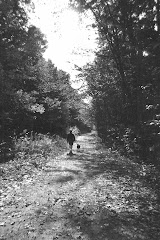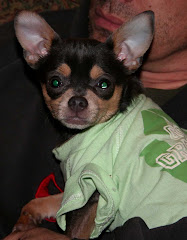 These are the first two chickens I bought years ago when I started in poultry. That's Boris Q on the left and Tallulah Jane on the right. They weren't exactly what I was looking for when I went out to buy my first pair, but when I saw them, my mind was made up. The conditions they were being kept in were deplorable: overcrowding to the point where none of the chickens could even turn their heads, the males were feather-picked to baldness due to stress-related aggression, they were bone thin, starving and dehydrated, and little Boris had a broken leg, most likely from his previous owner having stepped on him while trying to make his way through the inhumane clog of chickens in the pen where they were being kept. I chose Boris because he was the only cockerel who didn't try to attack me when I picked him up, and Tallulah because I had never seen a chicken who at four months old was still nearly chick sized. The two became instantly inseparable and remained so for the rest of their lives together.
These are the first two chickens I bought years ago when I started in poultry. That's Boris Q on the left and Tallulah Jane on the right. They weren't exactly what I was looking for when I went out to buy my first pair, but when I saw them, my mind was made up. The conditions they were being kept in were deplorable: overcrowding to the point where none of the chickens could even turn their heads, the males were feather-picked to baldness due to stress-related aggression, they were bone thin, starving and dehydrated, and little Boris had a broken leg, most likely from his previous owner having stepped on him while trying to make his way through the inhumane clog of chickens in the pen where they were being kept. I chose Boris because he was the only cockerel who didn't try to attack me when I picked him up, and Tallulah because I had never seen a chicken who at four months old was still nearly chick sized. The two became instantly inseparable and remained so for the rest of their lives together.It became apparent fairly quickly that Boris was more than just physically sub par from his previous mistreatment. He never crowed. He had seizures. He had trouble remembering how to get in and out of the barn, he wouldn't eat unless you put him directly in front of the food, and he didn't scratch and graze the way a normal chicken or rooster will when out and about in the yard. And always, Tallulah was right there, just like a mother hen with her little chick, pointing out tiny morsels in the grass to him, guiding him out of the forsythia hedge when he wandered in and panicked, unable to find his way back out again. The two of them would stand for hours, doing nothing at all.
People told me to kill Boris, that providing daily care for such a bird was a waste of time. He couldn't be bred (I never saw him hump anything out there anyways, not once), he cost money that was never recouped in any way, he was useless. And while this may have all been true, he had had such a horrific start to his life, there was no way I wasn't going to give him a happy home for as long as he lived. Pets are not expendable because they aren't perfect. Besides his rather lengthy list of flaws, he really was a truly beautiful bird to behold. Two pounds of soft, lush and beautifully colored feathers. And the gentlest rooster to ever walk this earth. But Boris aside, a great many times I also wondered if Tallulah might be as slow as him in some ways. She didn't dash about like my other hens. If you wanted to pick her up, like Boris, all you needed to do was simply walk over to her and lift her. She never joined the other hens in the flock, but simply stood there looking vaguely about, usually next to Boris, never more than a few feet away from him. She laid only a handful of eggs in her lifetime. She was very quiet; no cackling, no shrill calls ever came from her mouth save for one time. Her life was slow and dull.
When Boris became ill and we thought he was going to die, the two had to be separated while he underwent treatment. From out in the barn came the most desperate and mournful crying throughout the night. The next day, despite doctors orders, I moved Tallulah into the recovery cage with Boris and she immediately quieted back down. Surprisingly, Boris would live another three years and when his time came, Tallulah was with him, standing right beside him as he breathed his last, ever the quiet and stoic hen.
And then the most amazing thing happened. A few days after his death, when Tallulah knew she no longer needed to stay near poor, little special-needs Boris, she came alive. She was finally free to be the hen she might have been without her burden. She ran about, she scratched, she clucked, she got into little fights with the other hens. She was a chicken at long last. Clearly she had felt it was her duty to keep him safe, and it was her chicken kind of love for him that kept her loyal in spite of what was clearly a very depressing way of life for her. Her sudden transformation was startling yet exhilarating to behold. And little Tallulah Jane got be and act like a real hen for almost a year and a half before she too passed in old age.
She was a very special bird, and when people have said to me upon observing a bird at a swap meet or a show, "They're just birds. They have no feelings or brains," I sometimes tell them I beg to differ and relate my story. Sometimes I just walk away, but always I'm reminded of my two unusual chickens: the one who needed such desperate help and the one who was always there to give it to him unconditionally throughout her exceptional life.











No comments:
Post a Comment